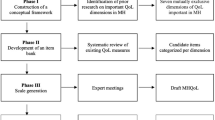Abstract
In response to suggestions that available measures may not adequately reflect the idiosyncratic nature of subjective quality of life, the schedule for the evaluation of individual quality of life (SEIQoL) was developed to allow individuals first to select and define their own dimensions of quality of life, and then to assign a relative weight to each of the dimensions they have chosen. A simplified version of the instrument, the SEIQoL-direct weighting (SEIQoL-DW), can be used to elicit similar information from subjects with impaired cognitive functioning. The present study explored the feasibility of using this technique with a sample of 35 clients with serious mental illness served by assertive community treatment (ACT) teams. The SEIQoL-DW was well accepted by the study cohort. The SEIQoL-DW's global index was correlated with the satisfaction with life scale (SWLS), and with the quality of life inventory (QOLI). The SEIQoL-DW may have potential as a clinical planning tool that allows respondents to define personally relevant quality of life dimensions upon which attainable goals can be based.
Similar content being viewed by others
References
Prince PN, Prince CR. Subjective quality of life in the evaluation of programs for people with serious and persistent mental illness. Clin Psychol Rev (in press).
Aubry T, Myner J. Community integration: A comparison of persons with psychiatric disabilities in housing programs and community residents who are neighbours. Canadian J Community Mental Health 1996; 15: 5-20.
Lehman AF, Ward NC, Linn LS. Chronic mental patients: the quality of life issue. Am J Psych 1982; 139: 1271-1276.
Leff J, Dayson D, Gooch C, Thornicroft G, Wills W. Quality of life of long-stay patients discharged from two psychiatric institutions. Psychiat Ser 1996; 47: 62-67.
MacGilp D. A quality of life study of discharged long-term psychiatric patients. J Adv Nursing 1991; 16: 1206-1215.
Pinkney AA, Gerber GJ, Lafave HG. Quality of life after psychiatric rehabilitation: The clients' perspective. Acta Psychiat Scand 1991; 83: 86-91.
Stein LI, Test MA. Alternative to mental hospital treatment: I. Conceptual model, treatment program, and clinical evaluation. Archives Gen Psychiat 1980; 37: 392-397.
Koivumaa-Honkanen H-T, Viinamaki H, Honkanen R, Tanskanen A, Antikainen R, Niskanen L, Jaaskelainen J, Lehtonnen J. Correlates of life satisfaction among psychiatric patients. Acta Psychiat Scand 1996; 94: 372-378.
Levitt AJ, Hogan TP, Bucosky, CM. Quality of life in chronically mentally ill patients in day treatment. Psychol Med 1990; 20: 703-710.
Sullivan G, Wells KB, Leake B. Clinical factors associated with better quality of life in a seriously mentally ill population. Hosp Community Psychiat 1992; 43: 794-798.
Bigelow DA, Brodsky G, Steward L, Olson M. The concept and measurement of quality of life as a dependent variable in evaluation of mental health services. In: Stahler GJ, Tash WR (eds), Innovative Approaches to Mental Health Evaluation 1982; 345-366.
Holcomb WR, Morgan P, Adams NA, Ponder H, Farrel D. Development of a structured interview scale for measuring quality of life of the severely mentally ill. J Clin Psychol 1993; 49: 830-840.
Frisch MB, Cornell J, Villanueva M. Clinical validation of the quality of life inventory: A measure of life satisfaction for use in treatment planning and outcome assessment. Psychol Assess 1992; 4: 92-101.
Diener E, Emmons RA, Larsen RJ, Griffin S. The satisfaction with life scale. J Personal Assess 1985; 49: 71-75.
Diamond R, Becker M. The wisconsin quality of life index: A multidimensional model for measuring quality of life. J Clinic Psychiat 1999; 60: 29-31.
Heinrichs DW, Hanlon TE, Carpenter WT Jr. The quality of life scale: An instrument for rating the schizophrenic deficit syndrome. Schizophrenia Bul 1984; 10: 388-398.
Lehman AF. The well-being of chronic mental outpatients. Archives Gen Psychiat 1983; 40: 369-373.
Murphy M, McCrum B, Keenan O. Quality of life: The patient's perspective. Nursing Stand 1991; 5: 29-31.
Browne JP, O'Boyle CA, McGee HM, McDonald NJ, Joyce CRB. Development of a direct weighting procedure for quality of life domains. Qual Life Res 1997; 6: 301-309.
Leplege A, Hunt S. The problem of quality of life in medicine. J Am Med Assoc 1997; 278: 47-50.
Hickey AM, Bury G, O'Boyle CA, Bradley F, O'Kelly FD, Shannon W. A new short form individual quality of life measure (SEIQoL-DW): Application in a cohort of individuals with HIV/AIDS. Bri Med J 1996; 313: 29-33.
McGee HM, O'Boyle CA, Hickey A, O'Malley K, Joyce CRB. Assessing the quality of life of the individual: The SEIQoL with a healthy and a gastroenterology unit population. Psychol Med 1991; 21: 749-759.
Campbell S, Whyte F. The quality of life of cancer patients participating in phase I clinical trials using the SEIQoL-DW. J Adv Nursing 1999; 30: 335-343.
Surles RC, McGurrin MC. Increased use of psychiatric emergency services by young chronic mentally ill patients. Hosp Community Psychiat 1987; 38: 401-405.
National Council of Welfare. Poverty Lines 1989. Ottawa: The Council.
Baronet AM, Gerber GJ. Psychiatric rehabilitation: Efficacy of four models. Clin Psychol Rev 1998; 18: 189-228.
Burns BJ, Santos AB. Assertive community treatment: An update of randomized trials. Psychiat Ser 1995; 46: 669-675.
McGrew JH, Bond GR, Dietzen L, McKasson M, Miller LD. A multisite study of client outcomes in assertive community treatment. Psychiat Ser 1995; 46: 696-701.
Atkinson MJ, Zibin S. Quality of life measurement among persons with chronic mental illness: A critique of measures and methods 1996; Health Promotion and Programs Branch, Health Canada. Ottawa: Minister of Supply and Services.
Cheng S-T. Subjective quality of life in the planning and evaluation of programs. Evaluation and Program Planning, 1988; 11: 123-134.
Author information
Authors and Affiliations
Rights and permissions
About this article
Cite this article
Prince, P.N., Gerber, G.J. Measuring subjective quality of life in people with serious mental illness using the SEIQoL-DW. Qual Life Res 10, 117–122 (2001). https://doi.org/10.1023/A:1016742628834
Issue Date:
DOI: https://doi.org/10.1023/A:1016742628834




